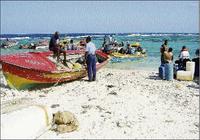Daraine Luton, Sunday Gleaner Reporter
Adapting to life on the cays is not easy. Fresh water is a scarce commodity and the threat of hurricanes brings uncertainty. Here, residents wait for a barge to bring water from Kingston. - Photo by Paul Williams
'Most fisherman can't read. Most a wi a dunce. Bwoy pickney follow dem father go a sea like turtle'
THERE ARE men at the Pedro Cays who are said to have been there since the place was one grain of sand. They have seen countless storms and captured an uncountable number of fish and conch.
Call them 'Cay stones', if you may, but they may not like the name. Mackie is one man who has seen many fish caught and many storms at Pedro Cays.
He is not an old man - just 51 - but has been on the Pedro Cays for nearly four decades, even though he does not fish anymore.
Introduced to the cays by his father when he was just a boy, Mackie has seen many changes in the fortune of fishermen.
"Thirty-seven years on the cays is a long time," he admits, while adding that in order to survive,people must adapt to changes.
Could not read or write
When Mackie's father introduced him to the sea as a boy, he could neither read nor write.
"Most fisherman can't read. Most a wi a dunce. Bwoy pickney follow dem father go a sea like turtle," Mackie says.
He tells The Sunday Gleaner that his highest level of education was basic school.
With only basic survival skills, it was not too long before the Great Bay, St Elizabeth, resident hit the sea.
"Where mi from is a dead-end place. Nuttin fi do but just go a sea," he says. A young side-kick, Mackie was soon learning the craft with his father.
Mackie spent several of his early working years making his money from the sea. He tells The Sunday Gleaner that the venture was lucrative to the point where he was able to open a business on the mainland.
However, he says that fishing suddenly became a very expensive venture. The cost for fuel, boat maintenance and for fish pots was getting too heavy. Added to that, many more fishermen were fishing on the Pedro Banks and so he decided to drop out.
When Mackie left fishing, he started a phone service. Being the only one on the cays with a telephone, Mackie found a market among the scores of fishermen who wanted to connect with people on the mainland. He says that he was making a tidy sum from selling telephone calls, but when the telecommunications sector opened up at the start of the decade, his business took a nose dive.
Another opportunity
Mackie had to think and act quickly. Hospitality and entertainment provided him with yet another opportunity, and he held on.
"Opportunities for dat very good here," he says.
"Every day and every night is a party. People spending dem money and dem having fun," he adds.
Like Mackie, Michael Hamilton has been on the cays for a very long time. He has, however, found fishing to be his calling and has no immediate intentions of giving it up for another endeavour.
When The Sunday Gleaner met Hamilton, the medium-size St Elizabeth man had been on the cays for eight days. He said that he would be spending eight months before returning to the mainland and by that time, he hoped to have $3 million to take home.
That is, however, if he does not become a victim of prostitutes who charge a high price for service and comfort on the cays.

